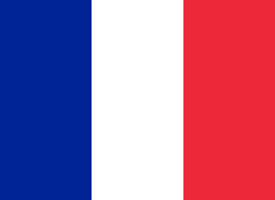 National Language : French
National Language : French
Population : 60,180,000
Area : 547,030 km.²
Religion : no religion is recognized officially ; most citizens are baptized Catholic, but only
20% are practicing ; large Muslim population (more than any other European country)
Currency : Euro (since Jan. 1, 2002)
Capital : Paris ; 2,120,000 inhabitants ; 105 km.²
President : Jacques Chirac (Foreign Affairs)
Prime Minister : Jean-Pierre Raffarin (Domestic Affairs)
Type of Government : Presidential Democracy ; General Elections for the President and Prime
Minister every 5 years ; next election in 2007 ; President and Prime Minister do not have to belong to the same party
Schools : Public schools available to all ; Obligatory between the ages of 6 and 16 ; Students
normally attend high school until age 18 ; May choose between high school and tech school . At age 15, students must choose which course of study to follow – the cirriculum is not the same for every student – there are specialized high schools for students who study math, science, languages, etc.
Geography : Temperate climate ; France has every type of landscape found in Europe (mountains, plains, forests, cliffs, vineyards, volcanoes) ; France is bordered by the Atlantic Ocean in the west, the Mediterranean Sea in the south ; there are 2 mountain chains – the Pyrenees along the southern border with Spain, and the Alps, in the east, bordering with Switzerland and Italy
Holidays : 12 National (mostly Catholic)
Typical Foods :
– Bread (the baguette, which a French person typically buys from the bakery every day) ;
– Cheese (There are 365 types of cheese, one for every day of the year. Most cheeses are
non-pasteurized, which is different than in the US, where all dairy products by law must be pasteurized.)
– Wine (the French are the largest consumers of alcohol worldwide)
– Frogs (they eat more frog legs than in any other country)
– Escargots (snails)
– – > There are more courses than in American meals. Generally, a meal is composed of
the appetizer, the entrée, bread and cheese, the dessert, and finally, coffee (espresso). Wine generally accompanies meals, and it is customary to serve champagne for almost any occasion.
History : Charlemagne is crowned as Emperor in the year 800 AD, and he goes on to establish the Occidental Empire. Four decades later, the Treaty of Verdun breaks the empire into three parts: the part west of the Rhone River becomes modern-day France. During the 11th and 12th centuries, the weakness of central power generates a feudal system. In the 17th and early 18th centuries, Louis XIV, the Sun King, epitomizes the power of the absolute monarchy. France is the leading European military power at this epoch. The French Revolution starts in 1789 and brings lasting social change. Napoleon reigns as Emperor between 1804-1815. He institutes administrative change, which is good for the country, but his wars in Europe weaken France. Foreign policy is centered around colonial expansion in the late 19th century. After WWII, a priority for the country is fostering stronger ties with Europe.
For a more detailled history, please click «here».

